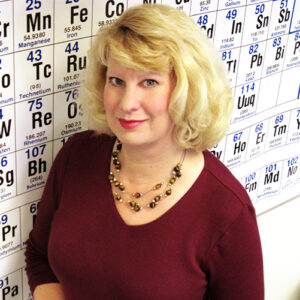In Recognition of the Unique


The first time I received a letter from the Disability Resource Office (DRO) regarding a visually impaired lecture student in my general chemistry course, I became very anxious. I was greatly concerned that I would be overwhelmed trying to teach a large lecture section and provide for the student. Fortunately, student S taught me that his physical challenge was not a limitation. Student S amazed me with his ability to recognize my voice when I said hello in the brickyard. It was a pleasure to meet with him twice a week for an hour to discuss chemistry, because he came prepared with questions after listening to the textbook. Together we rendered Lewis Structures and valence diagrams physical with pipe cleaners and beads for electrons. This minor investment of time enhanced my explanations to all students. To this day, I still use pipe cleaners and beads on the lectern overhead to explain electron pushing arrows and resonance.
For the last 18 years, I have had the honor of teaching general chemistry to thousands of students at NC State. My goal is to provide students with multiple tools that allow them to be successful in their chemistry course, to graduate and to pursue their dream career. Technology advances have been extremely helpful. Screen reading software is readily available for use with multiple file formats. Students may use their phone cameras to improve the viewing of lab experiments, allowing me to put away the large and quite unwieldy magnifying glass. Instructors can easily add captioning to videos. Forums allow students to ask questions non-verbally. Instructors upload tests into the portal, students take them with appropriate facilities, and DRO scans the results and returns them within one day. Education has many more formats than white chalk on a blackboard.
Accommodations are now an everyday process, simply communicating with students to set up the best circumstances for their success using the framework of the DRO letter. Student T, with physical limitations, had accommodations for additional testing time to write out his math proofs. We taped his test pages to the desk to keep them fixed while he wrote. He received one of the highest grades in the class that semester. Student K needed a specialized lab assistant for experiments and medical issues that might arise. Her medical companion was fully oriented in laboratory safety and procedures and worked alongside her. Her lab results were excellent. Student A had severe allergies to odors. We determined which experiments had minimal odors such that she could attend with a filtering mask, and modified the remaining assignments into simulations so she could complete them online. While all these students had unique obstacles, they also had the determination to overcome any barriers to their education. All they needed was someone to invest a little time and help them devise a plan. In all honesty, that is something we all need.
Lori Petrovich is a teaching associate professor and director of the General Chemistry Labs.


